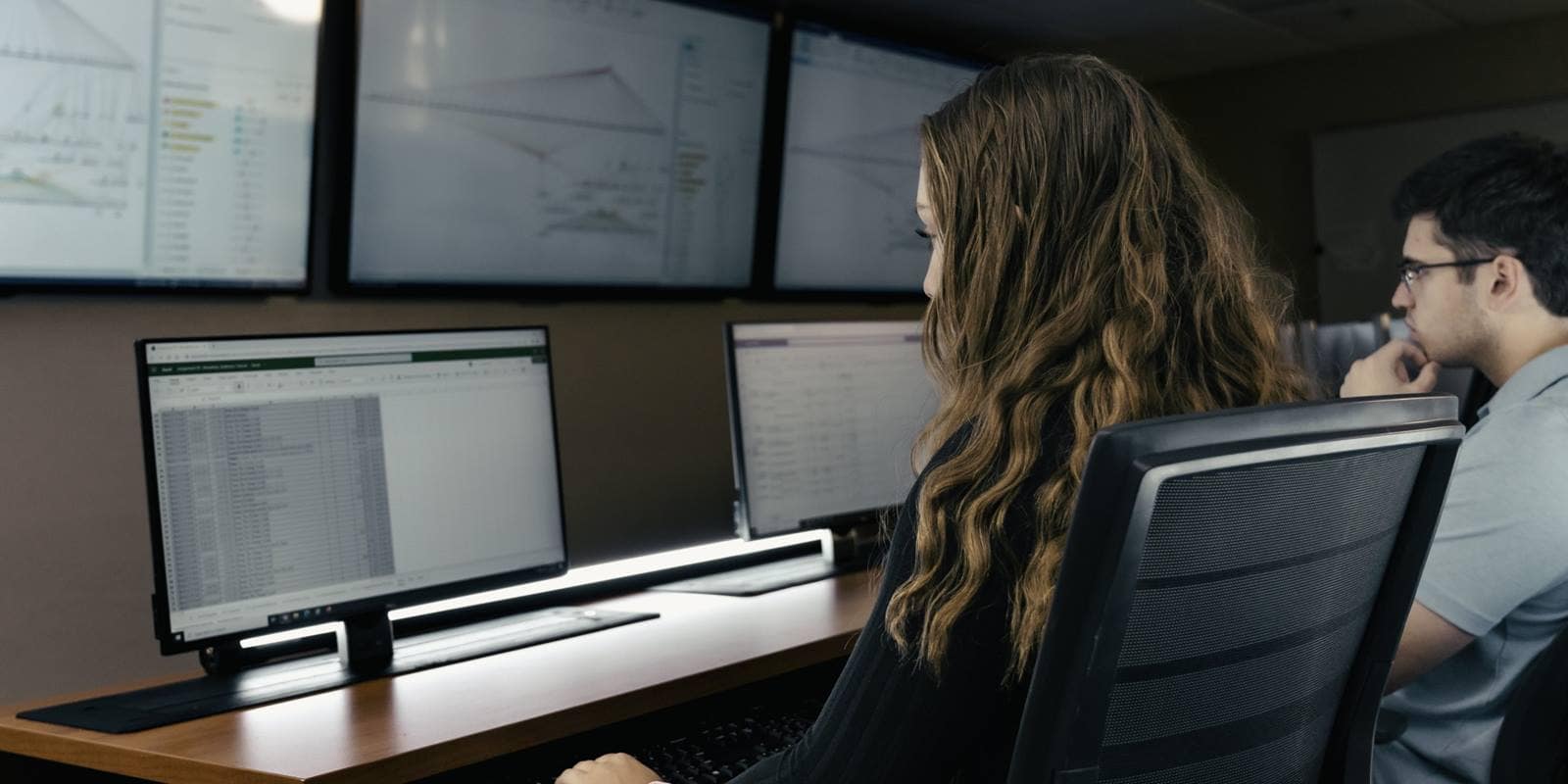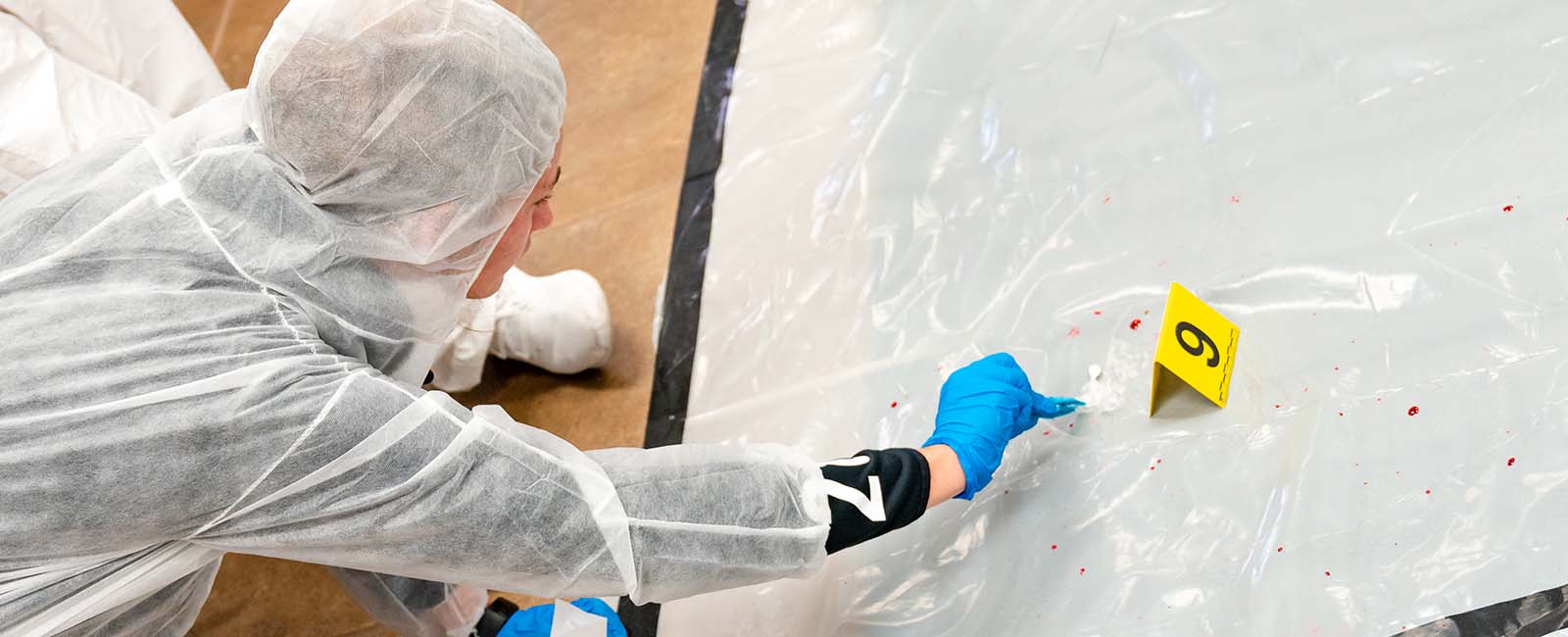
Bachelor of Science in
Forensic Accounting and Fraud Examination
In the Forensic Accounting & Fraud Examination degree, students are taught to find and defend against securities fraud and other types of financial fraud.
About the Bachelor of Science in Forensic Accounting & Fraud Examination
For inquisitive problem-solvers interested in the intersection of law enforcement and accounting, the Bachelor of Science in Forensic Accounting and Fraud Examination (FAFE) at Embry‑Riddle Aeronautical University's Prescott Campus may be a perfect fit. This program covers the four major sections of the Association of Certified Fraud Examiners’ professional certification:
- Financial Transactions and Fraud Schemes
- Law
- Investigation
- Fraud Prevention and Deterrence
Embry‑Riddle is one of the only schools in the nation to offer an undergraduate forensic accounting degree in a traditional, on-campus environment. As a result, students benefit from a hands-on approach to learning and enjoy access to state-of-the-art technology, lab space and software for data visualization and decision-making.
Student Learning Outcomes
Upon completion of the forensic accounting degree, you will have the opportunity to:
- Become a Certified Fraud Examiner prepared to investigate economic and financial crime
- Work in a variety of finance and accounting roles in business, government and nonprofit sectors
- Test for the Registered Forensic Investigator, Government Forensic Accountant and Certified Management Accountant certifications
Forensic Accounting & Fraud Examination Career Opportunities
Careers and Employers
Forensic accounting degree students graduate Embry-Riddle ready to begin careers as:
- Forensic Accountant
- Anti-Money Laundering Banking Specialist
- Internal and External Auditor
- Special Investigations Unit Fraud Investigator
- Risk Consultant
- Litigation Support Specialist
- Accounting and Financial Analyst
Forensic Accounting & Fraud Examination Salary Information
The average reported alumni salary in the field of fraud examination is $67,500 annually one-year post graduation, as of 2022.
DETAILS
About Forensic Accounting and Fraud Examination at the Prescott, AZ Campus
Forensic Accounting and Fraud Examination is housed in the nation’s first College of Business, Security and Intelligence, and students are uniquely positioned to learn among industry experts and explore the latest advances in fraud examination. Students in the forensic accounting degree train to pinpoint and defend against employee theft, securities fraud, identity theft and financial fraud.
Students are well connected to industry and build relationships with faculty with real-world experience from the private, public and government sectors. The curriculum is also designed to help students meet the federal requirements listed by the FBI, CIA, DEA, IRS and other government agencies.
Forensic Accounting & Fraud Examination Information
- Credits: 120
- Online or In-Person: In-Person
Helpful Links
- Tour our Prescott campus
- Discover the Department's Faculty
- Explore the Fields of Study: Applied Science & Business
- Find Related Clubs & Organizations
Student Learning Outcomes
Students will:
- Demonstrate extensive knowledge of the principles within the accounting discipline.
- Use knowledge of tax laws to compute tax liability for individuals, partnerships, and corporations.
- Apply auditing procedures and reporting requirements.
- Apply accounting knowledge in the field.
- Demonstrate proficiency in the accounting business core.
- Demonstrate proficiency in the legal/social business core.
Degree Requirements
The Embry-Riddle Aeronautical University – Prescott is a member of the Association of Collegiate Business Schools and Programs (ACBSP) and is accredited. The FAFE degree requires the successful completion of a minimum of 120 credit hours.
Program Requirements
General Education
Embry-Riddle degree programs require students to complete a minimum of 36 hours of General Education coursework. For a full description of Embry-Riddle General Education guidelines, please see the General Education section of this catalog.
Students may choose other classes outside of their requirements, but doing so can result in the student having to complete more than the degree's 120 credit hours. This will result in additional time and cost to the student.
| Communication Theory and Skills | 9 | |
| Computer Science/Information Technology | 3 | |
| Mathematics | 6 | |
| Physical and Life Sciences (Natural Sciences) | 6 | |
| Humanities and Social Sciences | 12 | |
3 hours of Lower-Level Humanities | ||
3 hours of Lower-Level Social Science | ||
3 hours of Lower-Level or Upper-Level Humanities or Social Science | ||
3 hours of Upper-Level Humanities or Social Science | ||
| Total Credits | 36 | |
Forensic Accounting Core (110 Credits)
The following course of study outlines the quickest and most cost-efficient route for students to earn their B.S. in Forensic Accounting and Fraud Examination. Students are encouraged to follow the course of study to ensure they complete all program required courses and their prerequisites within four years.
Courses in the core with a # will satisfy your general education requirements.
| ACC 210 | Financial Accounting | 3 |
| ACC 307 | Governmental and Not-for-Profit Accounting | 3 |
| ACC 312 | Managerial Accounting | 3 |
| ACC 329 | Forensic Accounting and Fraud Examination | 3 |
| ACC 339 | Intermediate Accounting | 3 |
| ACC 351 | Auditing Principles and Procedures | 3 |
| ACC 390 | Financial Statement Analysis Business Valuation | 3 |
| ACC 401 | Accounting Information Systems | 3 |
| ACC 429 | Fraud Auditing and Examination | 3 |
| ACC 490 | Detecting and Preventing Financial Statement Fraud | 3 |
| or BA 437 | Strategic Management and Consulting | |
| BA 189 | Introduction to Business | 3 |
| BA 201 | Principles of Management | 3 |
| BA 222 | Business Analytics Tools # | 3 |
| BA 311 | Marketing | 3 |
| BA 319 | Managerial and Organizational Behavior | 3 |
| BA 325 | Social Responsibility and Ethics in Management | 3 |
| BA 352 | Business Analytics for Decision Making | 3 |
| BA 370 | Machine Learning and Big Data | 3 |
| BA 390 | Business Law | 3 |
| BIO 120 & 120L | Foundations of Biology I and Foundations of Biology I Laboratory # | 4 |
| CI 119 | Introduction to Cyber Security for Non-Majors | 3 |
| COM 122 | English Composition # | 3 |
| EC 210 | Microeconomics # | 3 |
| or EC 211 | Macroeconomics | |
| FIN 332 | Corporate Finance I | 3 |
| General Education - Humanities Lower-Level Elective # | 3 | |
| General Education - Communications Elective # | 6 | |
| MA 120 | Quantitative Methods I # | 3 |
| or MA 140 | College Algebra | |
| MA 222 | Business Statistics # | 3 |
| PSY 101 | Introduction to Psychology # | 3 |
| PSY 306 | Psychology of Deception Detection | 3 |
| or PSY 336 | Forensic Psychology | |
| PSY 313 | Personality and Profiling # | 3 |
| or PSY 337 | Criminality | |
| SIS 200 | Introduction to the U.S. Legal System | 3 |
| SIS 220 | Investigative Methodology and Forensic Science # | 4 |
| SIS 342 | Interview Techniques and Tactics | 3 |
| or SIS 340 | Security Investigations and Interview | |
| SIS 352 | White Collar Crime | 3 |
| or SIS 411 | Procedural Laws and Evidence | |
| Total Credits | 110 | |
Open Electives (10 Credits)
| Open Electives | 10 | |
| Total Credits | 120 | |
- #
General Education Course
All Army ROTC students are required to complete SS 321 - U.S. Military History 1900-Present (3 credits) in order to commission.
Suggested Plan of Study
| Freshman Year | ||
|---|---|---|
| Fall | Credits | |
| BA 189 | Introduction to Business | 3 |
| BIO 120 & 120L |
Foundations of Biology I | 4 |
| COM 122 | English Composition | 3 |
| MA 120 | Quantitative Methods I | 3 |
or MA 140
|
College Algebra | |
| UNIV 101 | College Success | (1) |
| Credits Subtotal | 13.0 | |
| Spring | ||
| BA 201 | Principles of Management | 3 |
| BA 222 | Business Analytics Tools | 3 |
| Humanities Lower-Level Elective | 3 | |
| PSY 101 | Introduction to Psychology | 3 |
| SIS 200 | Introduction to the U.S. Legal System | 3 |
| Credits Subtotal | 15.0 | |
| Sophomore Year | ||
| Fall | ||
| ACC 210 | Financial Accounting | 3 |
| BA 319 | Managerial and Organizational Behavior | 3 |
| CI 119 | Introduction to Cyber Security for Non-Majors | 3 |
| MA 222 | Business Statistics | 3 |
| PSY 306 | Psychology of Deception Detection | 3 |
or PSY 336
|
Forensic Psychology | |
| Credits Subtotal | 15.0 | |
| Spring | ||
| ACC 312 | Managerial Accounting | 3 |
| BA 352 | Business Analytics for Decision Making | 3 |
| Communications Elective | 3 | |
| EC 210 | Microeconomics | 3 |
or EC 211
|
Macroeconomics | |
| SIS 220 | Investigative Methodology and Forensic Science | 4 |
| Credits Subtotal | 16.0 | |
| Junior Year | ||
| Fall | ||
| ACC 307 | Governmental and Not-for-Profit Accounting | 3 |
| ACC 329 | Forensic Accounting and Fraud Examination | 3 |
| FIN 332 | Corporate Finance I | 3 |
| Open Elective | 2 | |
| SIS 342 | Interview Techniques and Tactics | 3 |
or SIS 340
|
Security Investigations and Interview | |
| Credits Subtotal | 14.0 | |
| Spring | ||
| ACC 339 | Intermediate Accounting | 3 |
| BA 311 | Marketing | 3 |
| BA 370 | Machine Learning and Big Data | 3 |
| Communications Elective | 3 | |
| PSY 313 | Personality and Profiling | 3 |
or PSY 337
|
Criminality | |
| Credits Subtotal | 15.0 | |
| Senior Year | ||
| Fall | ||
| ACC 351 | Auditing Principles and Procedures | 3 |
| ACC 390 | Financial Statement Analysis Business Valuation | 3 |
| ACC 401 | Accounting Information Systems | 3 |
| ACC 429 | Fraud Auditing and Examination | 3 |
| Open Elective | 4 | |
| Credits Subtotal | 16.0 | |
| Spring | ||
| ACC 490 | Detecting and Preventing Financial Statement Fraud | 3 |
or BA 437
|
Strategic Management and Consulting | |
| BA 325 | Social Responsibility and Ethics in Management | 3 |
| BA 390 | Business Law | 3 |
| Open Elective | 4 | |
| SIS 352 | White Collar Crime | 3 |
or SIS 411
|
Procedural Laws and Evidence | |
| Credits Subtotal | 16.0 | |
| Credits Total: | 120.0 | |
Get Started Now:
Summary
120 Credits
Estimate your tuition by using the Tuition Calculator
View Financial Aid Information
Learn about our General Education
Find out about transferring credits to this degree
Learn more about our Veterans & Military benefits
View our Academic Calendar




